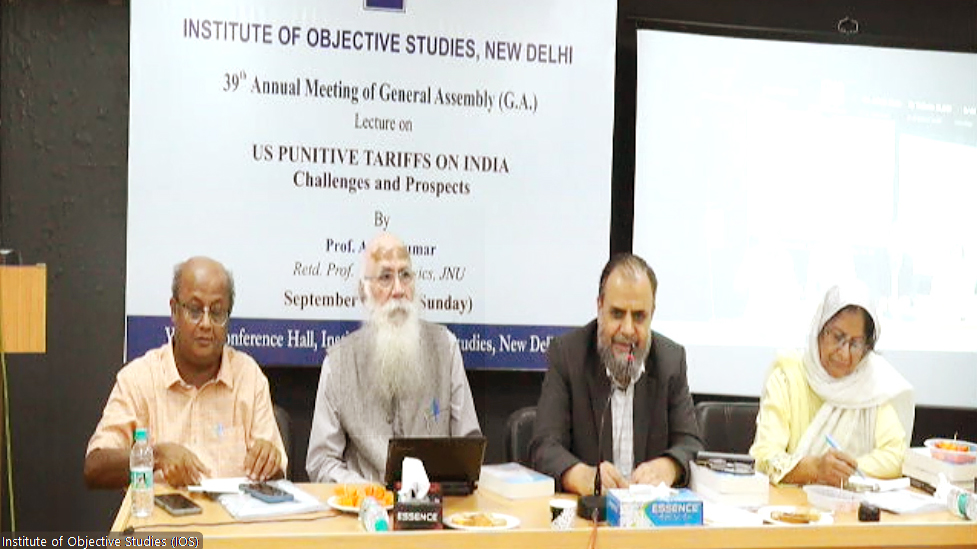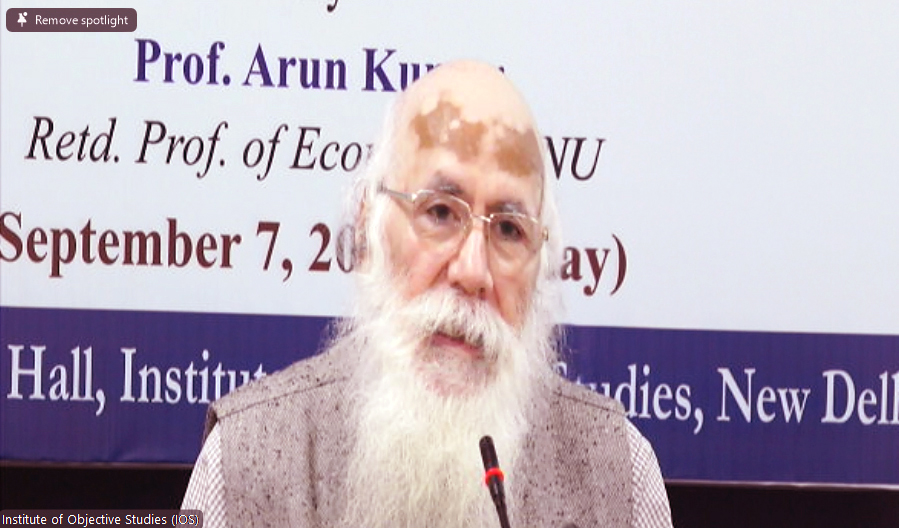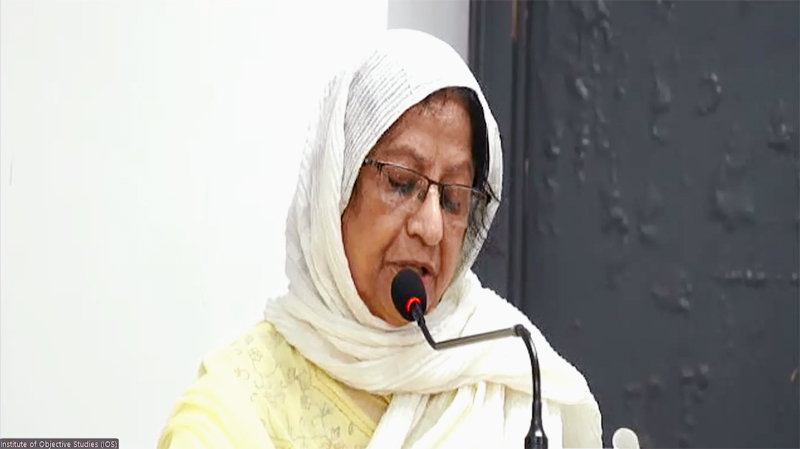IOS Lecture on “US Punitive Tariffs on India: Challenges and Prospects”

IOS Lecture on “US Punitive Tariffs on India: Challenges and Prospects”
New Delhi: A lecture on ‘US Punitive Tariffs on India: Challenges and Prospects’ was organised by the Institute of Objective Studies on September 7, 2025 to coincide with the 39th Annual Meeting of the General Assembly of the Institute.

Eminent economist and ex-professor of economics, Jawaharlal Nehru University, New Delhi, Prof. Arun Kumar delivered the lecture. Currently, he is the Malcolm Adiseshiah Chair Professor in the Institute of Social Sciences, JNU. He specialises in development, economics, public finance, public policy and macro-economics. He was also a part of the team to study the black economy for CBDT (1982-85).
Delivering the lecture, Prof. Arun Kumar said that the richest and technologically most advanced nation in the world was seeking to protect itself from much poorer countries like, India and the African nations. US President, Donald Trump’s bullying had succeeded because US’ big trading partners could not take a common stand. Trump, laid bare the hard face of capitalism, ‘might is right’. Since each nation would have a surplus of what they used to sell to the US, they would try to find markets for them and there could be dumping. “India is in a bind due to its past strategic mistakes. Its economy consists of vast unorganised sector where wages are low, resulting in inadequate internal demand. So, to meet the challenge, the need is to focus on employment generation, education, research and development and health”. He observed that the contrast was stark in the US trade negotiations with China and India. A penal duty of 25 percent had been imposed on India for trade with Russia while China had got 90 days extension. India was being punished for showing relative independence. But, India could not concede to Trump’s two key demands – opening up of agriculture and cultural ties with Russia. He said that US treasury secretary and President, Donald Trump’s advisors were saying so many things. Some of the top US functionary has been berating India quite frequently.
Prof. Kumar held that India was being targeted for showing relative independence in spite of being a US strategic partner. “Trump is behaving like a King, squeezing whoever he could. He did not spare US’ closest allies, like Canada and the European Union. President Trump had cancelled his visit to India for the QUAD summit. The US was not behaving as a strategic partner and asking its ally, the EU, to also punish India with high tariffs for Russian crude oil. Referring to one-sided deals, he noted that USA signed trade deals with Japan, EU, South Korea, etc. Surprisingly enough, richest and technologically most advanced nation was seeking to protect itself against much poorer countries. Multilateralism had been buried by the US globally. That was the reason why everyone was unhappy. He said that Trump managed to divide the world. There was global disquiet but helplessness. Donald Trump characterised April 2, 2025 as the ‘Liberation day’. There was a ring of justification in the argument for reciprocity even though incorrect. But high tariffs were protectionist and not reciprocal. He declared praise in implementation to buy time.
Referring to the rationale for proposed tariff, Prof. Kumar said that an across the board 12 per cent tariff on imports into USA and a much higher tariffs on its largest trading partners was not understandable. Commenting on US-China rivalry, he held that the two largest economies locked in the fight for global domination. Rivalry between the two big powers stemmed from the fact that China was a manufacturing hub of the world. Trump realised that alternative supply sources were not easy to climb down on tariffs and give time to negotiate. He noted that changes might come from courts and the Congress. It may be recalled that courts have intervened to stop some of the President Trump’s decisions. He said that capitalism was replacing soft face by a hard one. With the decline of Soviet Union in 1980s, alternative to capitalism weakened and disappeared in 1991. It was replaced by capital flows. Trump was a free marketer who granted more freedom to big business. The US was not generating good jobs. Trump’s high tariffs were due to the challenges facing capitalism. The US was not able to generate enough good jobs for its workers. Replying to the question why MNCs investing abroad, he noted that with the advent of WTO, world globalised rapidly, export and import ratio of GDP rose sharply for all nations. Production was globally integrated. Advanced countries miscalculated WTO impact. There was division between high, intermediate and low technologies. Low wages in the developing world were a source of low-cost supplies.
Prof. Arun Kumar explained that the terms of trade were in favour of advanced countries due to competition and monopoly of high technology. He said that the United States could not provide intermediate technology goods at low cost with its high minimum wages. He held that trade between China and the US would cease high tariffs of 100 percent. Both would have surplus which they would have to sell elsewhere. China had higher exports to the US than imports from the US. But the total US exports would be impacted. President Trump had caused huge uncertainty globally since October 2024. He also pointed out that de-globalisation had been set in motion. The process of de-globalisation started since the Ukrainian war. This process would further accelerate. He also opined that multilateralism would be replaced by bilateralism. The impact was most acute on unorganised sector and the marginalised. He believed that rapid spread of Artificial Intelligence (AI) was not helping marginalised sections. The US was trying to thwart China’s rise. China had the chance to become a dominant power if it did not dump and others transited it. It was better if there was coordination across countries. The US was continuing individually hard capitalism. He concluded saying that ‘Atma Nirbharta’ (Self-Reliance) would not work.
Presiding over the lecture, the Chairman of the IOS, Prof. M. Afzal Wani, held that there was a need for trust between nations. There was a conjecture both about Donald Trump and Narendra Modi. Trump changed his statement several times a day. “Trump is a Raja (King). India is giving concessions to Trump in its budget. Trade worth 15 billion dollars was agreed upon in February 2025”, he said. He also noted that 46 per cent workforce was engaged in the agriculture sector. It was very difficult for the people engaged in agriculture to shift to non-agriculture sector. He advocated for protecting agriculture sector. The US gave a subsidy of one percent to its farmers. Trade was the second largest sector after agriculture. India had no option but to protect its agriculture sector. Agriculture sector declined due to demonetisation. Vegetables and fruits were rotting. In Punjab, farmers threw vegetables like tomato and potato on roads because there were no buyers for them. Due to poverty in the unorganised sector, 80 percent of the population was getting ration free of cost. He said, “We are becoming de-globalised.” Trust of Russia in India also declined. China is a big power. Trust in China is growing whereas trust in the U.S. declined, he concluded.

Prof. (Ms.) Haseena Hashia, vice-chairperson, IOS thanked the speaker and all the members of General Assembly (G.A.) of the IOS and other participants.
Go Back